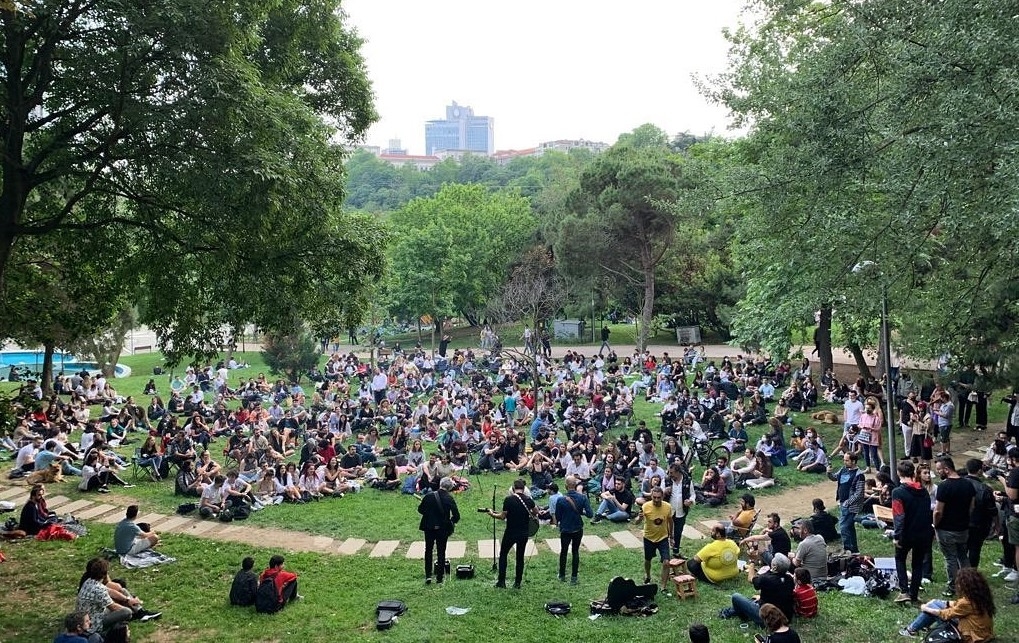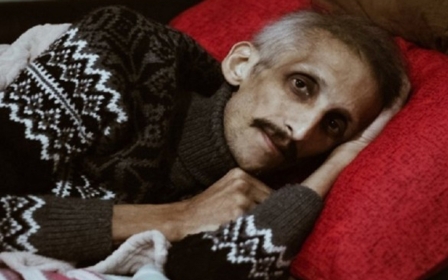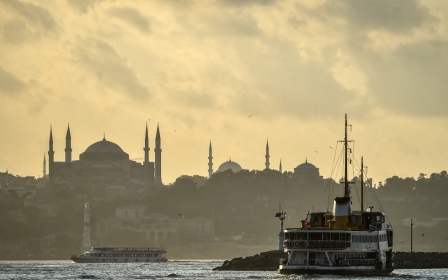Turkey: Musicians furious over new Covid-19 restrictions after desperate year

On 1 June, Turkish musician Hakan Altun posted a video of himself online, sitting in front of a picture of his country's founder Mustafa Kemal Ataturk, calmly cutting the strings of his oud with a pair of scissors.
Above the video in block capitals he wrote the words "Do you know what I mean?"
Many others on social media imitated him, cutting the strings of guitars, ouds, baglamas and other instruments.
The gesture was made because of mounting anger over the impoverishment of the music scene in Turkey during the Covid-19 lockdown, the feeble offering of support from the Turkish government, and the imposition of rules restricting performances. Many musicians believe that the latter have been arbitrary and motivated by a desire by the state to interfere in people's lifestyles.
Stay informed with MEE's newsletters
Sign up to get the latest alerts, insights and analysis, starting with Turkey Unpacked
Last Monday, speaking as he outlined the gradual loosening of his country's lockdown rules, Turkish President Recep Tayyip Erdogan said that live music would return after a long hiatus, but that restrictions would remain on music performed after midnight.
“If you don't mind, no one has the right to disturb anyone at night," he added.
'I am asking everyone to create awareness about this dictatorship and to stop going to Turkey for tourism purposes. There is no fun left anyway'
- Ezhel
The move provoked outrage. Few saw it as stemming from a genuine public health need, but rather a further attempt to erode personal freedoms in Turkey.
Musicians and activists began posting the hashtag "We do mind" on social media following the comments, which, many noted with grim irony, were issued on World Music Day.
Compared to some of the restrictions that many across the world have faced since the beginning of the Covid-19 pandemic, rules preventing the playing of music after midnight might seem fairly tame and not worth contesting.
But for musicians in Turkey, each restriction placed on their livelihoods is just one small part of a bigger conflict that is cultural and political - even existential.
Figures released by the Turkish Musicians and Performers Union last September claimed around 100 musicians in Turkey had already taken their own lives since the beginning of the pandemic, as the lockdowns and lack of support made earning a living from what they loved impossible.
In April, musicians dressed in black staged a symbolic funeral in the capital Ankara, burying their instruments to protest bans on live music.
Ezhel, a popular rapper with 1.8m followers on Instagram, wrote a scathing indictment of his home country in English and implored foreigners to stop coming.
"I am asking everyone to create awareness about this dictatorship and to stop going to Turkey for tourism purposes. There is no fun left anyway," he wrote.
One of those to publicly defy the ban is Okan Erbas.
Erbas primarily plays the baglama, a seven-stringed instrument sometimes referred to as a saz, which is arguably the country's national instrument and widely used in pop, folk and rock music.
Shortly after the ban was announced he posted a video of himself playing on a bench at night:
The song, Where is the Devil in that?, was written by folk poet Asik Dertli in the 18th or 19th century and is a fierce satire on religious leaders at the time who saw playing the baglama as sinful. Erbas sees echoes of the era in modern-day Turkey.
"The government is trying to change the lifestyle of people," he told MEE.
"They want to ban and restrict music by evaluating it within the framework of a conservative and nationalist concept. The worst part is that it is not a suggestion or statement of opinion, it is a restrictive legal regulation," he said.
Like many musicians in Turkey, Erbas struggled to keep making a living in his profession during the lockdown.
"I was looking for a job for eight months and could not get into many jobs just because I was a musician," he added, with employers concerned that his profession would mean a lack of permanence.
He pointed out that despite restrictions, numerous large-scale events were held by Erdogan and the Justice and Development Party (AKP) without social distancing and proper regulations, while cafes, venues and bars remained closed.
"Thousands of artists were unemployed due to unnecessary and ridiculous measures during the pandemic... the government took advantage of the pandemic precautions to suppress progressive, revolutionary, democratic and socialist people in the country."
Tough times for musicians
Being a musician in Turkey, like much of the world, has never been a secure business.
In December 2020, Culture and Tourism Minister Mehmet Nuri Ersoy announced the creation of a support programme called “Don’t Let The Music Stop," which he later said would be extended through to at least May 2021.
According to the programme, some 35,900 sector workers were paid 1,000 Turkish liras ($116) monthly in January, February and March.
Around 24,000 musicians are members of professional associations or unions in the country, a fraction of the roughly one million registered as working in the sector.
Many work cash-in-hand, which makes them ineligible for state support.
Haluk Levent, a folk-rock musician who helped revitalise the Anatolian Rock genre in the 90s, has been a prominent voice campaigning for support for musicians.
Through his Ahbap charitable organisation (which is named after a colloquial Turkish word for "friend") he has managed to raise funds to support struggling artists.
He has also managed to persuade other musicians to make gestures of support, such as when he convinced folk music legend Musa Eroglu to sell his baglama, and pop singer Aleyna Tilki to sell her stage costumes, and donate the proceeds.
Anger mounting
With anger mounting at the continued ban on live music, the rock band Redd on 7 June staged an outdoor gig in Istanbul's Macka Park, defying the restrictions.
Despite the presence of police, the performance came off without incident, but the band said they were still frustrated at the climate in the country.
"It was not a concert. We picked a public place intentionally. It was a kind of guerrilla event to protest the situation. We did it because somebody should have done something," said lead singer Dogan Duru, speaking to MEE on behalf of the band.
'It was a kind of guerrilla event to protest the situation. We did it because somebody should have done something'
- Dogan Duru, Redd lead singer
Like many bands in Turkey, Redd - which formed as a live music band in the 80s before they began recorded albums in 2004 - have long had an explicitly political edge.
In 2007, the band staged a special performance for Hrant Dink, the Armenian-Turkish journalist shot dead by ultra-nationalists, and in 2011 staged a similar gig in support of Ahmet Sik and Nedim Sener, who were in prison for their reporting on the exploits of the Gulen movement, then allies of the government.
"Any art form is political or needs to be political," said Duru, who previously tweeted that he had sold two of his guitars to pay the rent during the pandemic.
"We thought after our Macka Park that maybe some other musicians or bands would follow that act but as far as we saw that the only action came from Levent Uzumcu," he added, referring to the famous Turkish actor, who staged a similar protest to theirs.
As an established act, Redd were able to ride out the pandemic, but others found it more challenging.
"It is not 'difficult.' It is impossible. There are a lot of people who get money only when they work in the music business. Roadies, sound engineers, session musicians etc," said Duru.
"Those people don’t have any other income from the government or anywhere else. There is no union or association for them. You think about that for one and a half years."
Last week, rapper Agackakan (which translates as Woodpecker) and a group of fans gathered at Mehmet Ayvalitas Park in Istanbul's Kadikoy district, following the announcement of an impromptu concert on Twitter, in specific defiance of the new midnight rule.
Not long after arriving at the intended site, Agackakan and audience members were detained by police and fined for violating lockdown rules.
A culture war?
It has long been popular to talk about a "culture war" in Turkish politics - with everything driven by tensions between secular and religious communities
Kenan Bezhat Sharpe, a freelance journalist whose work heavily focuses on entertainment, music and culture in Turkey, pointed out that one of the key, often-stated goals of Erdogan and his government since coming to power in 2002 had been to try and establish "cultural hegemony" and raise a "pious generation" that would be more socially conservative and religious than previous generations.
The problem however, he said, was that outside the areas the state has direct control over - such as in education, state media and religious institutions - there were fewer people who were willing to lend their aid to that goal.
"There is a kind of tradition of the major novelists, directors, musicians etc being either left-wing or liberal," he explained.
Translation: Even in the most difficult conditions, we did not give up on music, dance and art in the Ida Mountains Resistance. We do not accept this intervention against our nature, living spaces and lifestyles, and those who turn the pandemic into an opportunity for their ideology; WE REJECT!
"And there are people like Orhan Gencebay for sure, who support the government, but as a whole the sector tends to be liberal rather than conservative in a lot of cases - much like in the US."
He also said that the music business also often overlapped with other sectors that the government was naturally antagonistic toward, such as the alcohol industry, which has been hit hard by a ban on advertising and eye-watering tax hikes in recent decades
"The ban on alcohol advertising was definitely the nail in the coffin for the festival industry," said Sharpe.
Though restrictions are being relaxed, the entertainment industry will still struggle to get back on its feet and the damage already done to the careers of so many artists is incalculable.
"They have been doing this for a long time, slowly but surely. That decision is also political like the others," said Duru.
"But this is not about only about musicians' lives - it is a public situation that interests all the people’s lifestyle. So people who are not involved in the music business also should say something about it."
The power of music
Music has played a political role in Anatolia for hundreds of years. The largest bulk of well-known folk songs in the country comes from the Asiks or bards who would travel the countrysides writing songs about love, religion, death, war and oppression.
In Anatolia, the most influential Asiks belonged the Alevi faith, a heterodox form of Islam that around a fifth of the country are currently thought to belong to.
Alevi musicians such as Pir Sultan Abdal became fierce critics of the Ottoman authorities, who regularly persecuted the Alevi minority - he was eventually hanged in the late 16th century for his transgressions.
His songs and poems, and those of other musicians and poets, would be spread down the ages while modern Asiks such as Asik Veysel added to the repertoire in the 20th century with compositions like Uzun Ince Bir Yoldayım (I Walk On A Long And Narrow Road), which is arguably now the country's most famous folk song.
While during the Ottoman Empire, rebellion often focused on religious repression, after the establishment of the Republic of Turkey in 1923, music tended to become riven along political lines - musicians like Hozan Sefkan and bands like Koma Berxweden recorded songs of resistance in Kurdish, defying the Turkish state's restrictions on the language.
Folk band Grup Yorum espoused an explicitly Marxist-Leninist outlook, while singer and baglama player Ruhi Su emulated Pete Seeger in recording the folk history of Anatolia with an eye to promoting progressive causes.
Rock musicians like Cem Karaca and Selda Bagcan recorded songs (often folk songs) that championed the oppressed and impoverished.
'In our country, especially the people who belong to the Alevi faith have had a music culture for over 1000 years, and almost all of the melodies performed in this culture were folk songs written against the oppressors'
- Okan Erbas, musician
Throughout it all, they faced repression, arrest, threats from the security services and ultra-nationalist and Islamist groups, and exile.
"The geography we live in is the home of various peoples. This diversity means a great wealth to our country. In our country, especially the people who belong to the Alevi faith have a music culture for over 1000 years, and almost all of the melodies performed in this culture were folk songs written against the oppressors," said Erbas.
He referenced a famous incident in 1993, what became known as the Sivas Massacre, where 37 people died after a far-right mob torched a hotel being used for an Alevi cultural festival, including numerous musicians.
He also referenced the recent deaths of Ibrahim Gokcek and Helin Bolek, two members of Grup Yorum who died in May last year after taking part in hunger strikes in protest at a ban on their concerts.
"For this reason, music has an important place in the struggle for democracy, equality and freedom in our country," he said.
"When we go deep into the history of Turkey, it is seen that hundreds of musicians, poets and folk poets were murdered by rulers."
Middle East Eye delivers independent and unrivalled coverage and analysis of the Middle East, North Africa and beyond. To learn more about republishing this content and the associated fees, please fill out this form. More about MEE can be found here.




